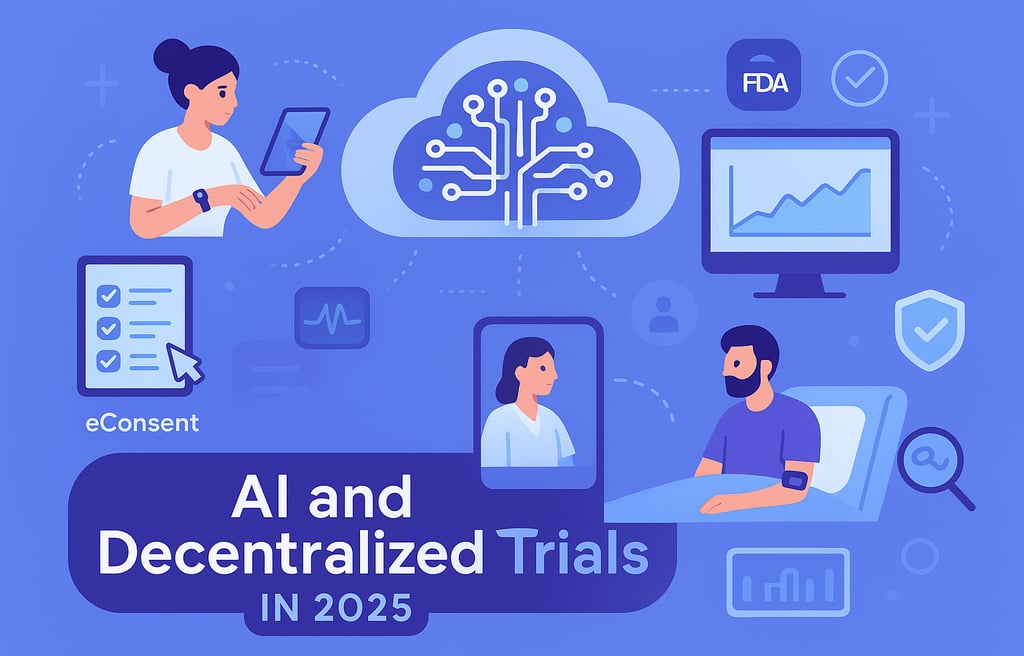How AI and Decentralized Trials Are Shaping the Future of Clinical Research in 2025
Discover how AI and decentralized clinical trials are revolutionizing research in 2025 by improving patient access, boosting data accuracy, and reducing study timelines. With regulatory momentum and real-world breakthroughs, ClinicalHawk provides future-ready solutions that empower sponsors and CROs to thrive in this evolving clinical trial landscape.
9/7/20253 min read


Introduction
The clinical research industry is undergoing a historic transformation. The convergence of Artificial Intelligence (AI) and Decentralized Clinical Trials (DCTs) is redefining how studies are designed, executed, and monitored. These innovations are not only accelerating drug development timelines but also expanding patient access and improving data accuracy. In 2025, as the demand for faster, safer, and more inclusive trials grows, AI and DCTs have become the most influential forces shaping the future of clinical research. ClinicalHawk, with its advanced digital solutions, is poised to play a central role in helping sponsors and CROs adapt to this new era.
AI’s Transformative Role in Clinical Trials
AI has moved beyond theory—it is actively reshaping every phase of clinical research.
AI in Study Design
Predictive analytics, powered by machine learning, is optimizing protocol development by anticipating patient dropout risks and identifying ideal trial locations.AI in Patient Recruitment
Advanced algorithms analyze electronic health records (EHRs) and real-world data to identify eligible participants, significantly reducing recruitment timelines and costs.AI in Data Management
Automated data cleaning, real-time error detection, and intelligent query management minimize human error, ensuring higher data accuracy and integrity.Digital Biomarkers & Wearables
With AI-driven interpretation of wearable data, researchers gain continuous, real-world insights into patient health, enabling earlier detection of adverse events and improved endpoint measurement.Regulatory Momentum
In 2025, the EMA approved AIM‑NASH, an AI-based tool for liver disease trial endpoints, signaling global regulatory acceptance of AI-powered clinical endpoints.
The Rise of Decentralized Clinical Trials (DCTs)
DCTs are no longer experimental—they are fast becoming the standard for modern clinical research.
Virtual Visits and Telemedicine
Patients can now participate in trials from their homes, eliminating geographic barriers and increasing participant diversity.eConsent and Remote Data Capture
Digital consent processes streamline onboarding, while remote tools allow patients to submit data securely without traveling to trial sites.Home-Based Sampling
Mobile health kits and at-home nurse visits reduce patient burden and improve retention.Wearables and Connected Devices
Continuous monitoring provides more robust datasets and enhances patient safety through early detection of anomalies.
The Combined Power of AI and DCTs
The integration of AI into decentralized trials is unlocking unprecedented opportunities:
Predictive Modeling in Remote Environments: AI enhances DCT protocols by forecasting potential challenges like supply shortages or patient non-compliance.
Improved Recruitment in DCTs: AI identifies and matches diverse populations to decentralized trials, improving representation and study outcomes.
Data Integrity at Scale: AI validates and harmonizes data collected from remote devices, ensuring compliance and reliability.
Real-World Developments Driving Change
AI-Driven Drug Discovery: In September 2025, Reuters reported AI is accelerating drug discovery while supporting the FDA’s push to reduce reliance on animal testing.
AI-Approved Endpoints: The EMA’s greenlight of AIM‑NASH demonstrates the regulatory shift toward accepting AI as a valid clinical trial tool.
These developments highlight the urgency for trial sponsors to embrace AI and DCT strategies to remain competitive.
Why This Matters for ClinicalHawk
ClinicalHawk’s digital ecosystem—spanning eTMF, EDC, and IWRS—offers a strong foundation for enabling AI-powered and decentralized trial models. With cloud-based architecture, real-time data access, and customizable workflows, ClinicalHawk equips sponsors and CROs to:
Accelerate trial setup and execution.
Enhance compliance with built-in audit trails.
Support decentralized workflows with mobile accessibility.
Prepare for AI integrations that streamline study design and data management.
Looking Ahead
As AI and decentralized trials become the backbone of clinical research, the industry will experience:
Shorter drug development timelines.
Increased patient diversity and access.
Stronger regulatory alignment with digital-first approaches.
ClinicalHawk is committed to helping stakeholders embrace these transformations with scalable, future-ready solutions.
Conclusion
AI and decentralized clinical trials are not just trends—they represent a new paradigm in clinical research. Together, they are unlocking faster, smarter, and more inclusive trials that benefit both patients and sponsors. By leveraging ClinicalHawk’s advanced solutions, organizations can navigate this evolution confidently, ensuring they remain at the forefront of innovation in 2025 and beyond.
ClinicalHawk: Empowering Clinical Trials Through Innovation and Integration with tools that enhance patient care, streamline clinical trials, and enable data-driven decision-making.
Clinical Software Solutions
Connect with Us Today
© 2024 ClinicalHawk Systems - Cloud-Based Software for the Worldwide Life Sciences Industry.
All rights reserved. Privacy Policy Terms & Conditions Powered by N2NAcers
Phone – (+91) 910 476 4988
e-Mail Us – Sales@N2NAcers.com
WhatsApp – (+91) 910 476 4988
